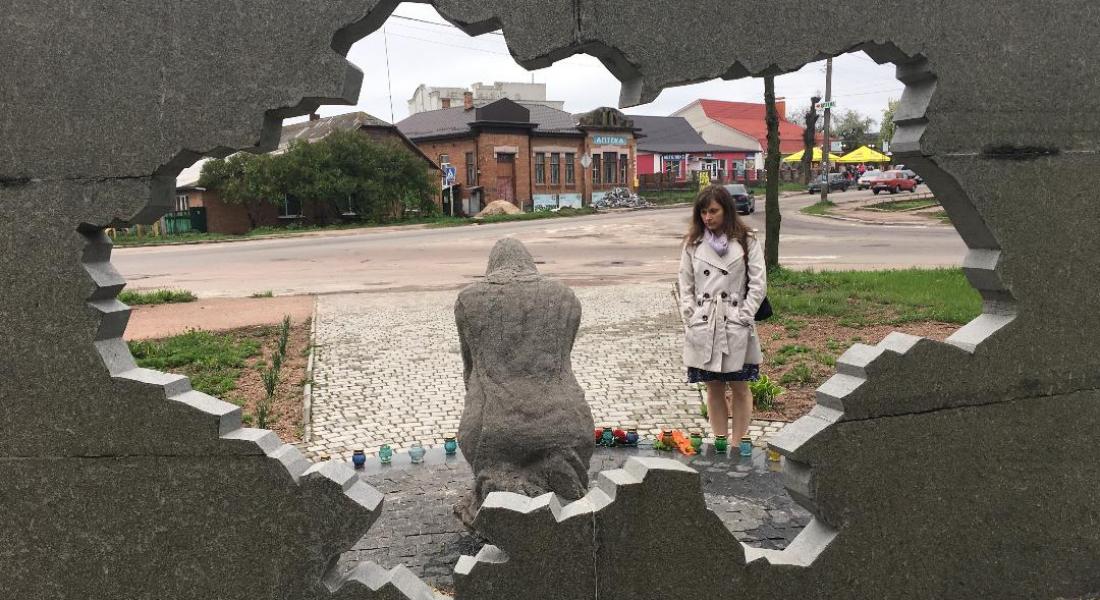
A former Kellogg doctoral student and PhD fellow who studies genocide and mass violence against civilians will receive the second annual Kellogg Institute Award for Distinguished Dissertation on Democracy and Human Development.
 Kristina Hook graduated with a PhD in anthropology and peace studies through the Kroc Institute's dual degree program earlier this year and is now a research assistant professor at George Mason University’s Jimmy and Rosalynn Carter School for Peace and Conflict Resolution, one of the top peace studies programs in the country. She also serves as executive director of the Carter School’s Better Evidence Project in the Center for Peacemaking Practice, which conducts research aimed at producing data that helps reduce and prevent large-scale political violence.
Kristina Hook graduated with a PhD in anthropology and peace studies through the Kroc Institute's dual degree program earlier this year and is now a research assistant professor at George Mason University’s Jimmy and Rosalynn Carter School for Peace and Conflict Resolution, one of the top peace studies programs in the country. She also serves as executive director of the Carter School’s Better Evidence Project in the Center for Peacemaking Practice, which conducts research aimed at producing data that helps reduce and prevent large-scale political violence.
Hook’s dissertation, entitled “When the Ukrainian World Was Destroyed: Genocidal Narrative Convergence and Stakeholder Interactions During National Crises”, examines the 1932-1933 Ukrainian Holodomor, an artificially induced famine in Joseph Stalin’s Soviet Ukraine that killed 4.5 million and continues to play an important role in Ukraine’s national identity. Her project seeks to understand how extreme events shape future generations, asking important questions about how social process and history impact contemporary democratic processes.
The Distinguished Dissertation Award highlights doctoral student research in the Institute’s core thematic areas of democracy and human development that has the potential to make substantial contributions to scholarship and policy.
Kellogg Institute Director Paolo Carozza said Hook’s research addresses how democracies, both young and old, are impacted by mass atrocities as well as one of the fundamental elements of human development: security.
“Kristina’s dissertation is an insightful and thorough piece of interdisciplinary research that weaves together both history and cultural anthropology,” he said. “It holds significance for democracies beyond Ukraine by helping us understand the residual effects of mass violence, and helps us understand how to better prevent genocides and other large-scale violence against civilians in the future.”
He noted that Hook was selected from a highly competitive pool of nominees, all of whom produced outstanding dissertations that made significant contributions to their fields of study.
In their nomination letters, Hook’s co-chairs described her dissertation as exceptional.
“It is, frankly, a tour-de-force,” Faculty Fellow Ernesto Verdeja, an associate professor of political science and peace studies, wrote.
“Her work,” he added, “is noteworthy for its theoretical sophistication and close connection to ethnographic research, without straying from the big comparative questions about how collective memory and narrative operate...(it) will make a major contribution to scholarship on national memory, genocide studies, and Eastern European democratization politics.”
Hook spent two and a half years conducting fieldwork in Ukraine during a period of armed conflict with Russia; she describes her work, which was funded in part by a Kellogg Graduate Research Grant and included interviewing more than 100 prominent Ukrainians, here.
Faculty Fellow Catherine Bolten, director of doctoral studies at the Kroc Institute for International Peace Studies, said Hook spent an extra semester in Ukraine so she could follow up on the latest political developments there, meaning she was writing her dissertation even as she was conducting research.
“Her dedication to her project and her craft, and obtaining the new material while still maintaining her writing schedule, is testament to the kind of professional work ethic that Kristina embodies,” Bolten said of Hook, who defended her dissertation virtually during the early months of the coronavirus pandemic.
Another co-chair, Faculty Fellow Rahul Oka, a research associate professor in the Keough School of Global Affairs, called Hook one of the best students he has ever worked with.
He said her research encourages sensitivity to local contexts in places with legacies of mass violence, and emphasizes recoveries that support human dignity and flourishing: “As this research ultimately contributes to broader understandings of our knowledge on preventing and mitigating modern unfolding mass atrocities, she therefore targets some of the most urgent forms of violence today.”
Hook, who hopes to eventually publish her dissertation as a book, said her findings could help scholars better understand events like the 1994 Rwandan genocide.
“One important application of my dissertation will be to understand possible causal relationships between post-genocidal conditions and the subsequent rise of authoritarian figures” as happened in Rwanda, she said.
The award, which carries a $1,000 prize, will be presented in a virtual ceremony during the Kellogg Advisory Board’s annual meeting in November.





